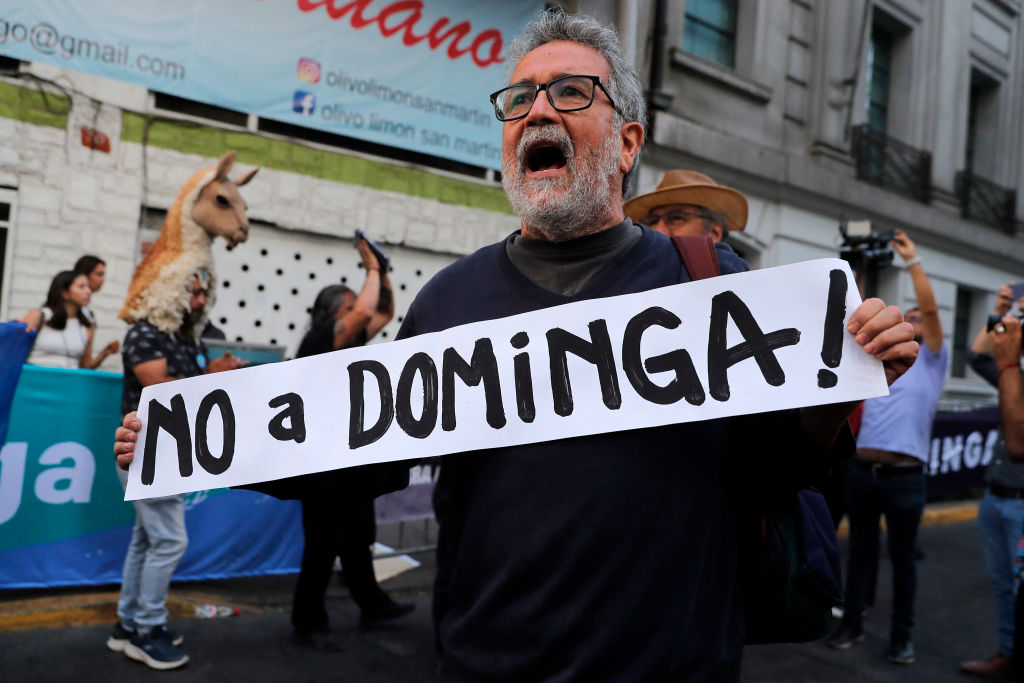The decision by Chile’s government to scrap the massive Dominga copper and iron mining project in January, and the resulting court battles, have roiled debates over red tape and regulation in the country, where natural resources make up 77.6% of exports. These debates—which go far beyond the mining sector—have become a campaign issue ahead of the November general election as the business community demands lighter regulation and President Gabriel Boric defends his record and tries to forge compromises with his critics.
On June 1, in the last national address of his term, Boric announced that he aims to pass permitting reform by the end of the month. “Investment projects will not move forward if we do not manage to modernize and streamline permitting processes,” he said. “We are advancing decisively in this direction, and I hope this permitting reform will be approved [in June] in Congress.”
The legislation, currently before the Senate, intends to reduce permitting timelines by 30%-70%. “It’s a fundamental project for our economy and our country … that has over 100 articles and affects 40 laws in various sectors,” Economy Minister Nicolás Grau said in March. “It’s complex because it’s a very important issue that requires a structural solution.”
Boric took office in 2022, committed to stricter regulations on mining and other industries. However, with the once-promising economy seemingly locked into low growth, voters appear more inclined to criticize excessive red tape—or permisología, as the issue is known locally. Boric’s proposed reform is an effort to meet critics halfway. If it passes, it could boost investment in mining, green hydrogen, and a variety of other sectors. It could also help allies of Boric—who cannot run for consecutive terms as president—campaign as more effective advocates for growth, which the IMF currently projects at 2% this year and an average of just 2.3% over the next five years.
However, opponents on the right, eager to wield red tape as a campaign issue and introduce more aggressive legislation, could sink the current package. All this signals that Chile is poised to streamline permitting regulations, though the fact that permisología will be an election-season flashpoint makes the timing and nature of coming reforms uncertain.
This includes Boric’s “Environmental Evaluation 2.0” legislation, which would moderately streamline environmental permitting—and shows how difficult it is to thread the needle between competing interests. The center-right Center for Public Studies sharply criticized the bill for the extensive discretion courts would retain to halt projects, while on the other hand a major environmental NGO condemned it for favoring “powerful economic interests.”
A key precedent
Dominga’s controversial saga is at the heart of the debates now coming to a head. The late center-right President Sebastian Piñera (2010-2014; 2018-2022) was an investor in the project, and in 2010, nine months into his first term, he sold his share to a longtime business partner. But in 2021, during his second term, a scandal erupted when it was revealed that the sale was contingent upon no changes being made to Chile’s environmental laws, and Piñera narrowly escaped impeachment.
The project seeks to invest $2.5 billion in two open-pit mines and a new port facility 500 miles north of Santiago. The port is planned in an area close to a nature reserve inhabited by vulnerable species, and while Dominga insists it will take measures to mitigate any risk to wildlife, opponents have insisted the port is simply inconsistent with their protection.
Dominga was initially approved by Chile’s Environmental Evaluation Service and the Council of Ministers, but then was rejected by center-left President Michelle Bachelet in 2017. Dominga’s controversies helped make the environment a major campaign issue when Boric ran and won in 2021. He remains opposed, and the project is now before Chile’s Constitutional Court.
Those supporting Dominga argue it is too big an investment to lose, especially because mining accounted for around 13.6% of GDP and 58% of exports in 2022. For its part, the Boric administration asserts that it is not anti-mining, and during his national address, he stated plainly, “Chile is, has been, and will be a mining country.” However, the director of Chile’s professional association of geologists, Román Flores, has noted that almost all major approvals in recent years have been for expansions of existing mines.
Beyond mining
Similar wrangling is occurring across various sectors. Chile’s forestry industry, for example, has gained increasing importance, producing exports valued at almost $6.4 billion in 2024. However, critics have decried the creation of large monoculture plantations of pine and eucalyptus, arguing that they are more prone to disease and fire risk, and put pressure on increasingly scarce water resources. Beyond purely environmental concerns, the rise of the forestry industry has led to sometimes violent clashes with Indigenous activists, who contest the firms’ right to operate in certain territories.
Meanwhile, in the fisheries sector, tightening regulations seem not to have prevented success. The cold waters of southern Chile are now the site of an extensive aquaculture industry, focused primarily on farmed salmon, of which Chile is the world’s second-largest exporter. In 2024, trout and salmon exports were the country’s third-biggest export after only copper and fresh fruit. This industry has damaged once-pristine fjords and seabeds with pesticides, antibiotics, and other contaminants, so authorities have strengthened regulations, despite industry accusations that they rely uncritically on the views of environmental organizations.
In the electrical generation sector, several major projects have been abandoned, such as the $1.4 billion Paposo power station in northern Chile. The plant aimed to utilize desalinated seawater to reduce its freshwater consumption, but it was shut down by regulators due to “significant impact” on local flora and fauna as well Indigenous communities.
New legislation
Chile’s business community has lobbied vigorously to loosen the permitting process, and there has been a steady stream of criticism in the media, labeling it a “sickness” and a “stone” blocking investment. However, the reckless expansion and neglect of environmental harm that have marked some previous projects are partly responsible for the current opposition.
For instance, in 2022, Australia’s BHP, the owner of the massive Escondida copper mine, was fined $8.2 million for extracting more water than allowed from the environmentally sensitive Atacama salt flat—since 2005. Moreover, south-central Chile, where the country’s forestry industry is concentrated, has become the epicenter of increasingly extensive and destructive megafires. This suggests that long-term sustainability relies in part on effective regulation to mitigate risks and protect public interests.
The need to jumpstart the economy will be a central issue in the November elections, in which voters will choose a new president, the entire Chamber of Deputies, and half of the Senate. In all likelihood, permitting reform is coming. How soon, however, is up in the air, and how far it goes will probably depend on the mandate delivered by the public at the ballot box.






